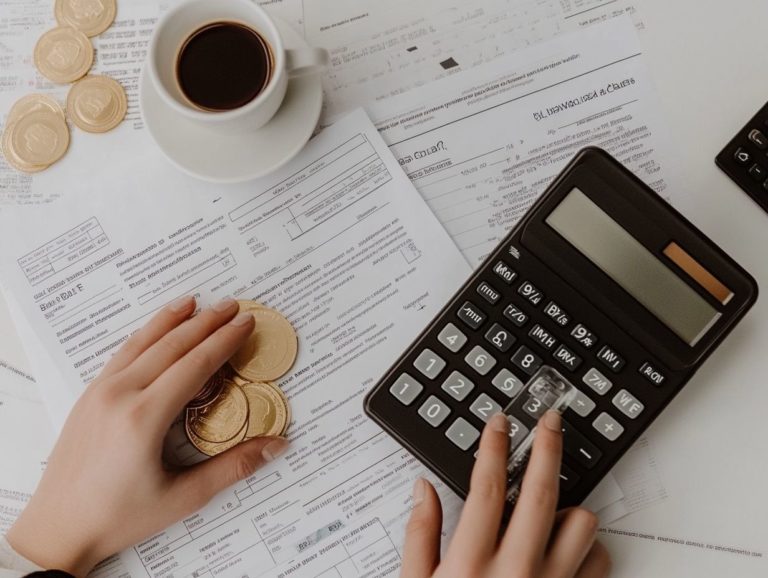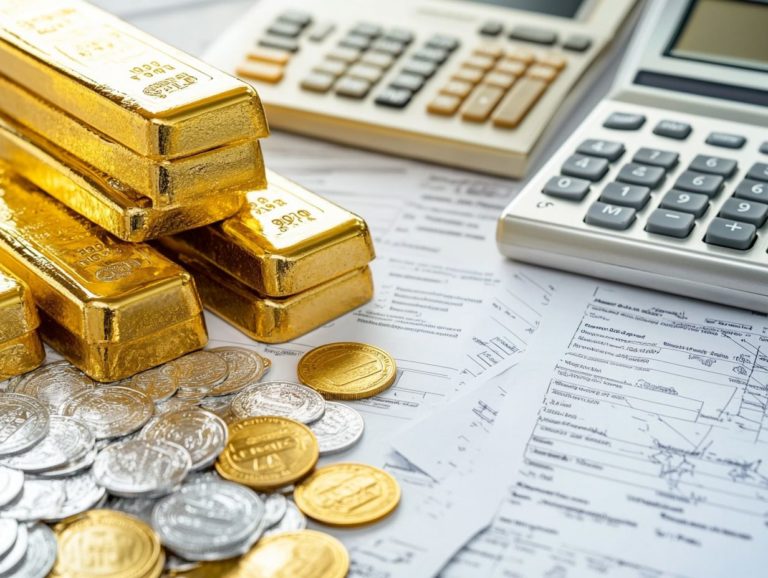Best Ways to Manage Taxes on Precious Metal Collections
Understanding taxes on precious metals can feel overwhelming, especially for collectors like you. Grasping the different types of taxes and their implications is essential, as these can significantly impact your investments.
This article explores factors influencing taxation based on market value and the size of your collection. It also offers practical strategies for effective tax management, including planning and using tax-advantaged accounts.
You will find discussions on key legal considerations and valuable resources to help you make informed decisions about your precious metal collection.
Contents
- Key Takeaways:
- Understanding Taxes on Precious Metals
- Factors Affecting Taxation of Precious Metal Collections
- Strategies for Managing Taxes on Precious Metal Collections
- Legal Considerations for Tax Management
- Resources for Tax Management
- Frequently Asked Questions
- What are the best ways to manage taxes on precious metal collections?
- Can I deduct my precious metal collection from my taxes?
- Are there any tax implications when selling my precious metal collection?
- Is there a way to minimize taxes on my precious metal collection?
- Do I have to pay taxes on inherited precious metal collections?
- What happens if I don’t report my precious metal collection on my taxes?
Key Takeaways:
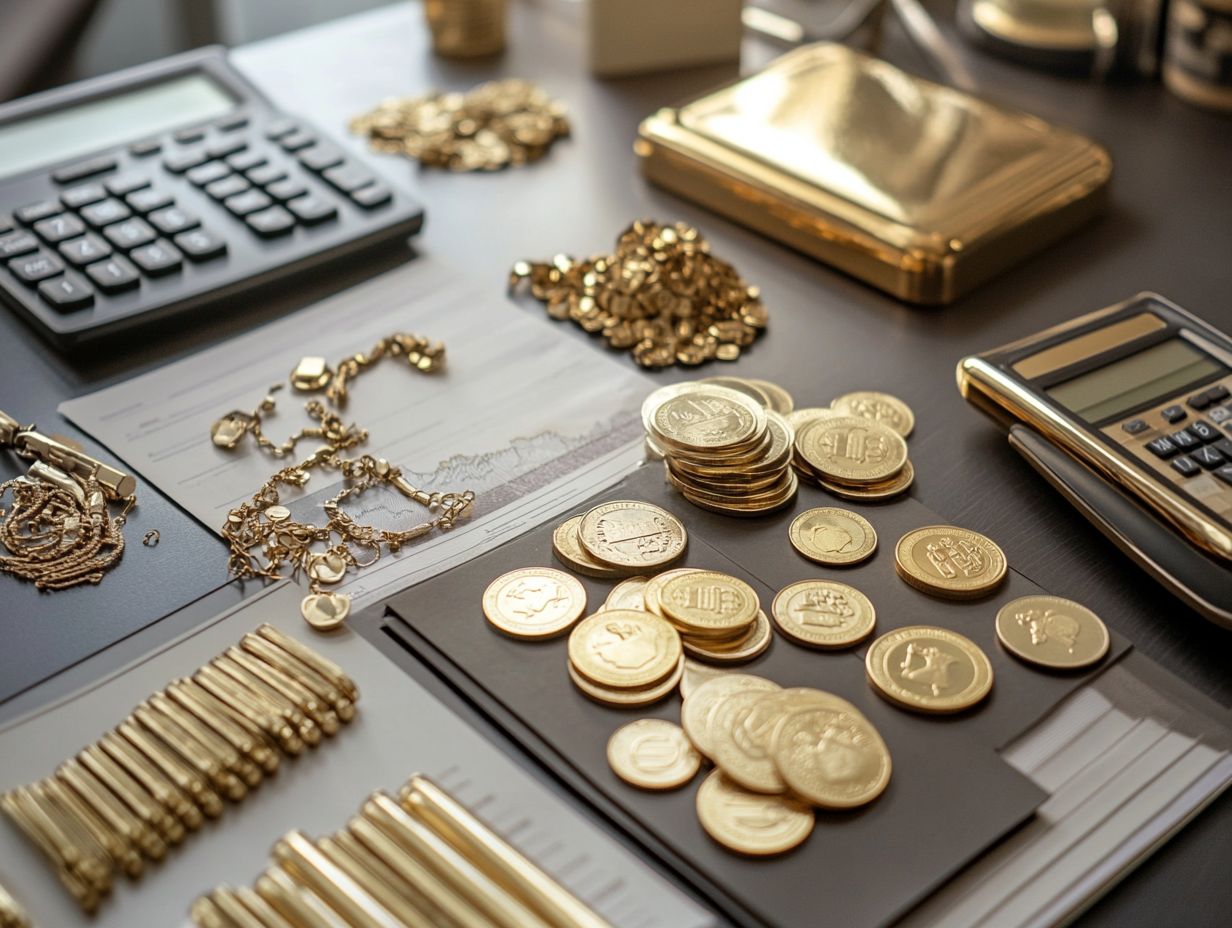
- Understand the different types of taxes that affect precious metal collections to avoid unexpected expenses.
- Evaluate market value and collection size when planning taxes for effective strategies.
- Plan your taxes early to save money using tax-advantaged accounts.
Understanding Taxes on Precious Metals
Knowing the tax implications of precious metals, like gold and silver, is vital for investors and collectors. The IRS views these investments as assets that can increase in value, which come with specific tax responsibilities, including capital gains tax.
When you sell your precious metals for a profit, you must report those gains on your tax return. You need to be familiar with relevant reporting requirements, especially the differences between short-term and long-term capital gains. These distinctions can significantly affect your overall tax liability and influence your financial planning strategies.
Types of Taxes and Their Implications
Various taxes apply to your investments in precious metals, with capital gains tax being the most prominent. This tax applies when you sell your holdings for a profit, highlighting the need for effective tax strategies.
Understanding short-term versus long-term capital gains taxes is crucial for maximizing your investment returns. Short-term gains, applicable to assets held for one year or less, are taxed at ordinary income rates, often resulting in higher tax bills. In contrast, long-term capital gains, realized on assets held for over a year, benefit from significantly lower tax rates.
If you sell an asset at a loss, you can offset that loss against other gains, effectively lowering your overall taxable income. Ignoring these reporting obligations can lead to unintended consequences, such as penalties or IRS audits. Therefore, staying informed about your tax obligations is not just advisable it s essential.
Factors Affecting Taxation of Precious Metal Collections
Several factors can significantly influence the taxation of your precious metal collections, including market value and the overall size of your collection. These elements directly impact the capital gains you realize upon sale and play a crucial role in your financial strategy.
The IRS has outlined specific guidelines about how these factors affect your investment portfolio, particularly during economic uncertainty. Understanding these nuances will help you navigate your investment landscape more effectively.
Market Value and Collection Size
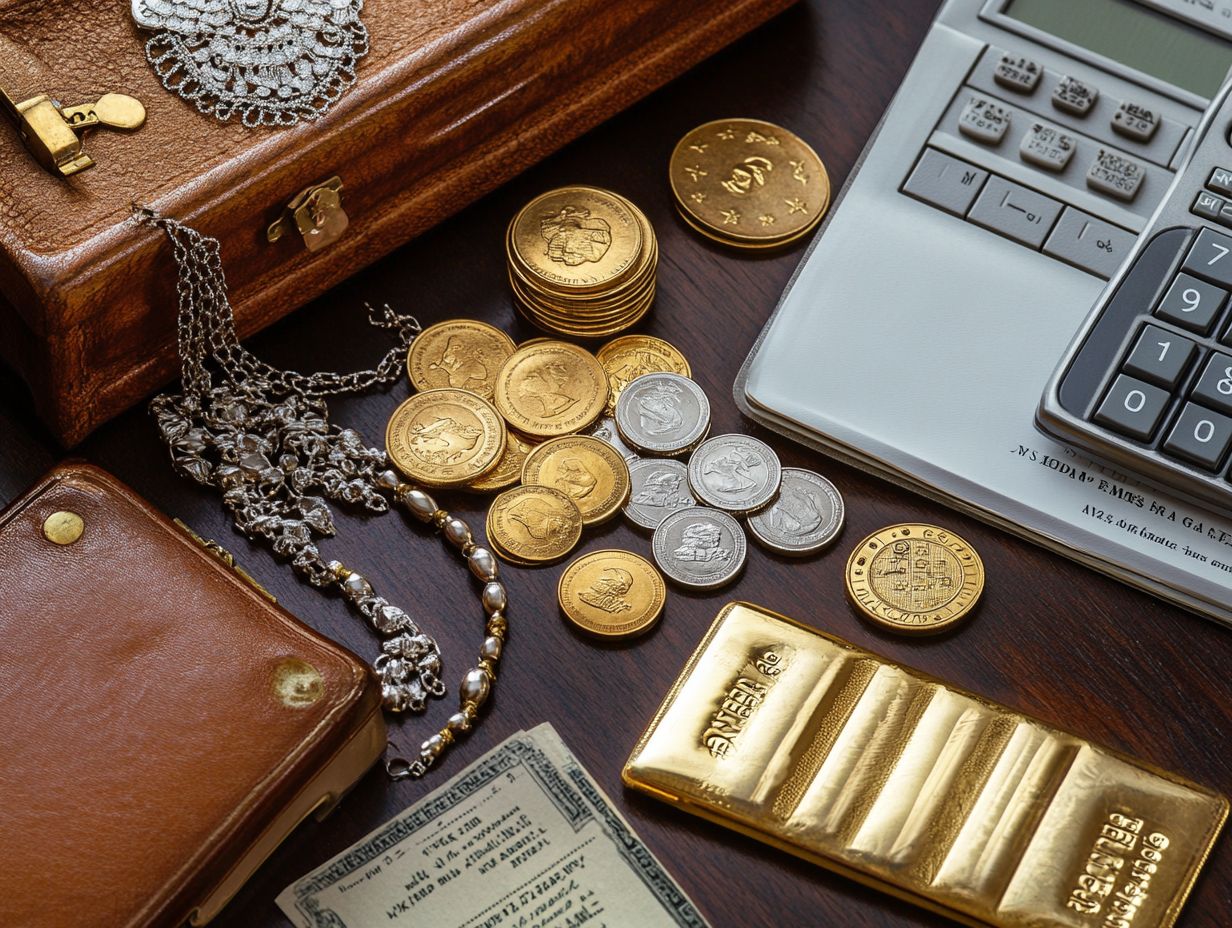
The market value of precious metals and the overall size of your collection are crucial factors in determining the tax implications of capital gains, which are the profits made from selling an asset. These elements intricately link the financial worth of these assets to your investment strategies.
Understanding this financial landscape enables you to make informed decisions, especially when navigating the complexities of market fluctuations. Bullion dealers are invaluable in this process as they assess current values and provide insights that can significantly shape your buying and selling strategies. Professional appraisals add another layer of evaluation, ensuring that your collection is accurately represented in your financial planning.
The scale of your collection not only dictates potential investment returns but also affects the tax burdens that may arise during asset liquidation. Therefore, adopting effective management practices like regularly reviewing market conditions and considering diversification within your portfolio is essential for maximizing the potential benefits of your precious metal investments.
Strategies for Managing Taxes on Precious Metal Collections
Developing effective strategies for managing taxes on your precious metal collections is crucial for maximizing your investment benefits while minimizing liabilities. Smart tax planning is key, and utilizing tax-advantaged accounts like IRAs can significantly enhance your financial outcomes.
Tax Planning and Timing
Tax planning and timing are essential elements of a successful investment strategy for precious metals. This approach enables you to navigate capital gains and minimize your liabilities through well-informed financial decisions.
Consider this: astute investors recognize that selling during specific tax years, particularly when their income drops significantly, can place them in lower tax brackets. This shift results in reduced tax rates on their sales. Likewise, being aware of peak market conditions when precious metal prices surge due to global economic uncertainties allows you to maximize profits. By strategically timing your sale to align with your personal financial objectives, you can truly leverage market dynamics.
Developing a comprehensive strategy that addresses both your immediate financial needs and the potential for long-term capital appreciation is crucial. This balanced approach can really enhance your investment performance while minimizing any unwanted tax implications.
Utilizing Tax-Advantaged Accounts
Utilizing tax-advantaged accounts like Individual Retirement Accounts (IRAs) to hold precious metals can significantly elevate your investment strategy, granting you both tax deferral and potential exemptions from capital gains tax upon account distribution.
Among the different types of IRAs, self-directed IRAs truly shine, as they allow for a broader array of investment options, including precious metals like gold, silver, and platinum. It’s essential for you to grasp the IRS regulations (Internal Revenue Service), which govern these accounts and outline acceptable forms of these metals and the necessary requirements for the quality of the metals. For example, bullion bars and coins must meet a minimum fineness to qualify; failure to comply can lead to substantial penalties or even disqualification of the IRA.
Despite these regulations, the advantages of diversifying your investments through such accounts can be significant, providing a robust hedge against inflation and market volatility while enhancing your overall tax strategies.
Legal Considerations for Tax Management
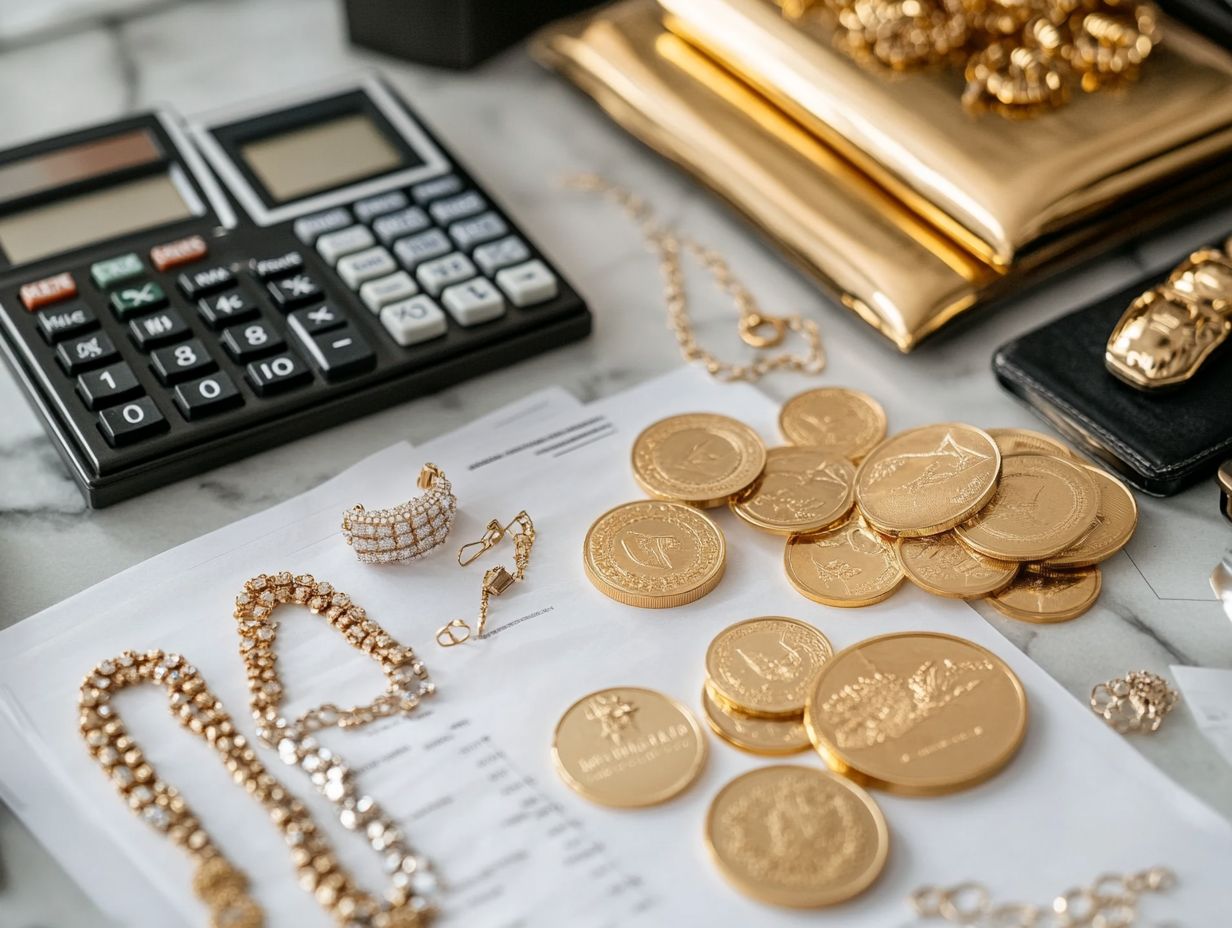
Navigating the legal landscape of tax management for precious metals is crucial for you as an investor or collector. This ensures you remain fully compliant with IRS regulations while steering clear of costly penalties, especially when differentiating between capital assets and collectibles.
Your understanding of these intricacies can significantly impact your financial outcomes and peace of mind. Don’t miss out on maximizing your investment potential act now to ensure your strategies are up to date!
Tax Laws and Regulations for Precious Metals
Tax laws and regulations surrounding precious metals are intricate and markedly different from those governing other types of investments. It s essential for you to grasp the IRS reporting requirements to ensure compliance while optimizing your tax outcomes.
Take the time to familiarize yourself with specific exemptions that might apply, such as those related to certain collectible coins and bullion. Understanding potential capital gains the profit from selling an asset is crucial to your financial strategy.
Great record-keeping can make your life so much easier during tax season! Accurate documentation is key to substantiating your claims during tax filing. Utilizing IRS forms, like Form 1040 for individual income tax reporting and Form 1099-B for reporting proceeds from broker and barter exchange transactions, can streamline your process and help you avoid any penalties.
Therefore, staying informed and organized is paramount for anyone engaging in the precious metals market.
Resources for Tax Management
Utilizing resources for tax management is essential for you as an investor or collector of precious metals. Seeking professional assistance can significantly enhance your understanding. Leveraging online tools can simplify the complexities of reporting requirements and ensure compliance with IRS regulations.
Professional Assistance and Online Tools
Seeking professional assistance and leveraging online tools can greatly elevate your tax management approach for precious metals. This not only clarifies IRS regulations but also streamlines your reporting process.
Engaging with certified public accountants (CPAs) who specialize in the taxation of precious metals can prove invaluable. Their expertise equips them to navigate the complexities of various tax scenarios with ease. Tax advisors familiar with this niche offer strategic insights that can help you maximize deductions and minimize liabilities.
Utilizing various online platforms such as investment tracking software and tax calculators enables you to monitor your holdings in real time while ensuring compliance with reporting requirements. These tools typically feature user-friendly interfaces, automatic capital gains calculations, and reminders for key tax deadlines. Start tracking your investments today to make tax season a breeze!
Frequently Asked Questions

What are the best ways to manage taxes on precious metal collections?
1. Keep detailed records: It is essential to track all purchases, sales, and any other transactions related to your precious metal collection. This will help you accurately report your gains and losses for tax purposes.
2. Understand tax laws: Make sure you are aware of the specific tax laws surrounding precious metal investments in your country, as they can vary. Consult a tax professional if necessary.
3. Consider holding in a retirement account: By holding your precious metals in a retirement account, such as a self-directed IRA, you can defer taxes until you withdraw the funds in retirement.
Can I deduct my precious metal collection from my taxes?
Unfortunately, personal collections are not tax-deductible. However, if you are a dealer or actively trade precious metals, you may be able to deduct certain expenses related to your business.
Are there any tax implications when selling my precious metal collection?
Yes, there are taxes to consider when selling your precious metal collection. If you have held the metals for less than a year, any gains will be taxed as ordinary income. If you have held them for more than a year, they may be subject to the lower capital gains tax rate.
Is there a way to minimize taxes on my precious metal collection?
One way to minimize taxes is to hold onto your collection for an extended period. This will qualify for the lower capital gains tax rate and potentially save you money. You can also offset gains with any losses from other investments.
Do I have to pay taxes on inherited precious metal collections?
In most cases, inherited precious metal collections are not subject to taxes. However, if you decide to sell them, you may be responsible for reporting any gains or losses on your tax return.
Ready to take charge of your precious metal investments? Start organizing your records today!
What happens if I don’t report my precious metal collection on my taxes?
If you don t report your precious metal collection on your taxes, it s considered not reporting your taxes. This can lead to serious consequences, including penalties, fines, or even jail time.
It s crucial to accurately report all income and assets on your tax return. Protect yourself by staying compliant!












